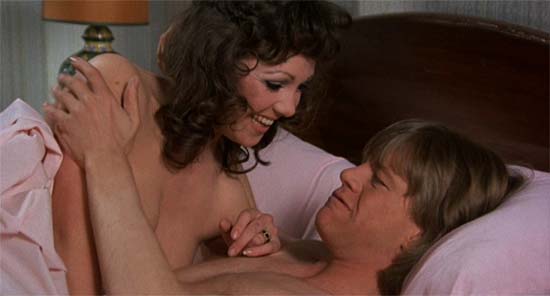 From Alfred Hitchcock to Powell & Pressburger, the Ealing comedies to kitchen sink dramas, British film was a stalwart warhorse for decades, loved by audiences, esteemed by critics; yet by the 70’s, the industry began to sink into a rut. There was only solution to shake the British studios out of their doldrums: sex. In the words of John Cleese (in The Meaning of Life): “Sex, sex, sex, sex, sex, sex, sex.” Enter Timothy Lea, saving the day with a ladder slung over his shoulder and a dopey caveman grin.
From Alfred Hitchcock to Powell & Pressburger, the Ealing comedies to kitchen sink dramas, British film was a stalwart warhorse for decades, loved by audiences, esteemed by critics; yet by the 70’s, the industry began to sink into a rut. There was only solution to shake the British studios out of their doldrums: sex. In the words of John Cleese (in The Meaning of Life): “Sex, sex, sex, sex, sex, sex, sex.” Enter Timothy Lea, saving the day with a ladder slung over his shoulder and a dopey caveman grin.
Confessions of a Window Cleaner was based upon a bestseller by “Timothy Lea,” aka journeyman writer Christopher Wood. According to Wikipedia – and I am at its mercy on this subject – there were nineteen Timothy Lea Confessions novels, each detailing the central character’s sexual conquests and comic misadventures. Nineteen seems like a lot, doesn’t it? I mean, four or five, the premise might start to get a wee bit exhausted, but nineteen? This places the series in the category of Harlequin romances, or those action-oriented men’s franchises like The Destroyer, which now fill up many a used bookstore’s shelves; one shouldn’t be surprised that Wood actually wrote Remo Williams: The Adventure Begins (1985), which is based on The Destroyer series. And I used to love the Destroyer books, and one of the first VHS tapes I ever purchased was Remo Williams, so I guess I better shut up about the Confessions books.
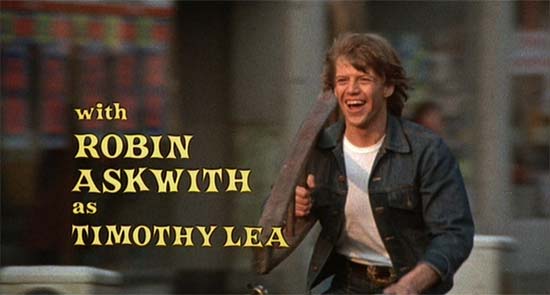 Anyway, Confessions of a Window Cleaner, the (one assumes) eagerly anticipated film adaptation of the Timothy Lea novel, was lensed in 1974 and became the year’s biggest box office hit. Yes, Timmy Lea had taught the British film industry how to score with audiences (and then I’m sure he made a single entendre, winked at the camera, and slipped in a puddle while wacky music blared). Sex, sex, sex, sex, sex, sex, sex.
Anyway, Confessions of a Window Cleaner, the (one assumes) eagerly anticipated film adaptation of the Timothy Lea novel, was lensed in 1974 and became the year’s biggest box office hit. Yes, Timmy Lea had taught the British film industry how to score with audiences (and then I’m sure he made a single entendre, winked at the camera, and slipped in a puddle while wacky music blared). Sex, sex, sex, sex, sex, sex, sex.
I’m sorry, I got a bit distracted. Back to the film. Robin Askwith plays Timmy, a young fellow just past the acne, and newly employed to Sidney Noggett (Anthony Booth), the owner of a window cleaning agency whose motto is “We Rub It Better For You.” Philandering Sidney is married to Timmy’s sister Rosie (an acquittably charming Sheila White, thank you very much). They’re all living under one roof, Britcom-style: Timmy, Sidney, Rosie, and Timmy’s parents (Bill Maynard and Dandy Nichols). Occasionally we intrude upon this domestic bliss for some comic shenanigans: Mr. Lea brings home a giant mounted moose-head, and makes pains to display it while Sidney berates his lack of taste, and Mrs. Lea fusses inconsequentially; Rosie, severely pregnant, lounges about the apartment making random food requests which Sidney struggles to fulfill (Fudge! Pineapple!). But Timmy just wants to get lucky with “birds,” and it’s in this endeavor that only Sidney can assist.
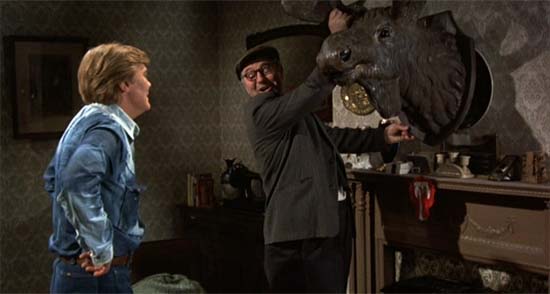 You see, in Confessions of a Window Cleaner, which takes place on that hidden planet which orbits on the opposite side of the Sun, it is the window cleaner, and not Parliament, who performs a significant function in keeping British society running smoothly. He is hired not to clean windows, but to provide sexual gratification for lonely housewives. This is expected of him. And good thing Timmy’s now around, because Sid was running out of energy. Timmy, alas, is a virgin, and his only experience with women is accidentally glimpsing their nude bodies while he washes their windows, and making an endless stream of wink-wink, nudge-nudge comments in voiceover, witty phrases like: “Blimey, they’re big for their age – they’re also big for my age!” and “I’ve heard of your work gettin’ on top of you, but not you gettin’ on top of your work!” – as well as the Voltaire-like observation: “Quite a knocker factory!”
You see, in Confessions of a Window Cleaner, which takes place on that hidden planet which orbits on the opposite side of the Sun, it is the window cleaner, and not Parliament, who performs a significant function in keeping British society running smoothly. He is hired not to clean windows, but to provide sexual gratification for lonely housewives. This is expected of him. And good thing Timmy’s now around, because Sid was running out of energy. Timmy, alas, is a virgin, and his only experience with women is accidentally glimpsing their nude bodies while he washes their windows, and making an endless stream of wink-wink, nudge-nudge comments in voiceover, witty phrases like: “Blimey, they’re big for their age – they’re also big for my age!” and “I’ve heard of your work gettin’ on top of you, but not you gettin’ on top of your work!” – as well as the Voltaire-like observation: “Quite a knocker factory!”
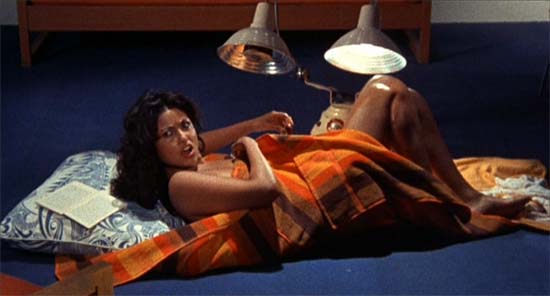 Perhaps growing tired of Timmy’s voiceovers, Sid drags him down to the local strip club, to introduce him to his “very obliging second cousin” Lil. The cockney Lil, one of two actresses in the film to get badly dubbed into an atrocious “comic” accent, is very obliging only up to a point. As she lies on top of the impotent Timmy, he says, “I don’t know what’s come over me,” to which she quickly responds, “Well, it isn’t me.” (Candide, page 43.) At last he does manage to get his rocks off, not with Lil but with her suspender strap. It could have happened to anyone, but Timmy is now desperately worried he’ll become a suspender fetishist.
Perhaps growing tired of Timmy’s voiceovers, Sid drags him down to the local strip club, to introduce him to his “very obliging second cousin” Lil. The cockney Lil, one of two actresses in the film to get badly dubbed into an atrocious “comic” accent, is very obliging only up to a point. As she lies on top of the impotent Timmy, he says, “I don’t know what’s come over me,” to which she quickly responds, “Well, it isn’t me.” (Candide, page 43.) At last he does manage to get his rocks off, not with Lil but with her suspender strap. It could have happened to anyone, but Timmy is now desperately worried he’ll become a suspender fetishist.
 Yearning for a satisfying and ordinary sexual experience, he gets one but not the other with one of Sid’s favorite lonely clients, who comes on to him like a locomotive. Due to an accident with some spilled dishwashing fluid, Timmy loses his virginity somewhere underneath a giant pile of soap suds, which apocalyptically fills the kitchen. So euphoric is Timmy at his first conquest that he rattles off his most breathless voiceover yet: “Well, Jackie had certainly taught me how to come clean. Now I know what they mean by ‘the ultimate detergent.’ Talk about soft hands and forever glowing bubbles. Taught me something else too: it’s just like learning to ride a bike. Once you finally can stay up, it’s no problem. In fact right there and then I could’ve won the Tour de France…”
Yearning for a satisfying and ordinary sexual experience, he gets one but not the other with one of Sid’s favorite lonely clients, who comes on to him like a locomotive. Due to an accident with some spilled dishwashing fluid, Timmy loses his virginity somewhere underneath a giant pile of soap suds, which apocalyptically fills the kitchen. So euphoric is Timmy at his first conquest that he rattles off his most breathless voiceover yet: “Well, Jackie had certainly taught me how to come clean. Now I know what they mean by ‘the ultimate detergent.’ Talk about soft hands and forever glowing bubbles. Taught me something else too: it’s just like learning to ride a bike. Once you finally can stay up, it’s no problem. In fact right there and then I could’ve won the Tour de France…”
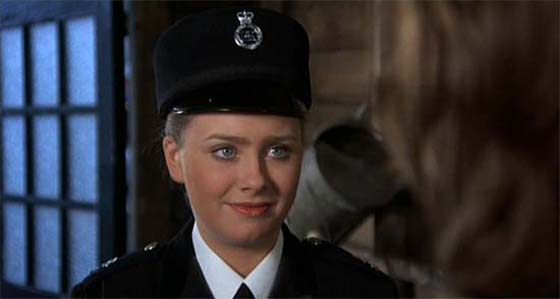 This is the very next spoken line of dialogue in the movie: “Hard at it?” “On and off, yes,” answers Timmy. Movie! Why don’t you just sit a spell and take a breather? Luckily, arriving in the nick of time is Linda Hayden, playing Elizabeth Radlett, a policewoman with whom Timmy strikes up an awkward courtship. Awkward, meaning that on their first date, Timmy aggressively cops a feel, offers a smirk and a smutty pun, and then wonders what’s wrong with birds that they just don’t understand him? But Elizabeth Radlett is the film’s secret weapon, and in order to understand this you have to realize that Linda Hayden is the most gorgeous and charming British actress of the 1970’s. Her career, unfortunately, went the way of British movies – promising, and then straight into cheap exploitation. She had a notable and controversial debut performance, still a teenager, in the Lolita-esque melodrama Baby Love (1968); incidentally, the moment in Confessions when Timmy takes Elizabeth to the movies and then tries to grope her, but accidentally gropes the leg of the middle-aged woman next to him (again: it could happen to anyone), is a parody of a famous Baby Love scene. Hayden went on to two cult-hit horror movies, Taste the Blood of Dracula (1970) and The Blood on Satan’s Claw (1971), but for the remainder of the decade had a hard time finding purchase in anything but sexploitation and, um, Queen Kong (1976). It’s a shame, because her presence can even brighten up a film as dire as this one. It helps that the director is also a talent fallen on hard times: Val Guest (The Quatermass Xperiment), who knows how to light her – take a look at the moment when Elizabeth is on the couch next to Timmy, and leans her head back, taking a drag from her cigarette, as the light frames her face. A cheapie cash-in like this should not look this gorgeous. Even her big nude scene is shot like a Rembrandt painting.
This is the very next spoken line of dialogue in the movie: “Hard at it?” “On and off, yes,” answers Timmy. Movie! Why don’t you just sit a spell and take a breather? Luckily, arriving in the nick of time is Linda Hayden, playing Elizabeth Radlett, a policewoman with whom Timmy strikes up an awkward courtship. Awkward, meaning that on their first date, Timmy aggressively cops a feel, offers a smirk and a smutty pun, and then wonders what’s wrong with birds that they just don’t understand him? But Elizabeth Radlett is the film’s secret weapon, and in order to understand this you have to realize that Linda Hayden is the most gorgeous and charming British actress of the 1970’s. Her career, unfortunately, went the way of British movies – promising, and then straight into cheap exploitation. She had a notable and controversial debut performance, still a teenager, in the Lolita-esque melodrama Baby Love (1968); incidentally, the moment in Confessions when Timmy takes Elizabeth to the movies and then tries to grope her, but accidentally gropes the leg of the middle-aged woman next to him (again: it could happen to anyone), is a parody of a famous Baby Love scene. Hayden went on to two cult-hit horror movies, Taste the Blood of Dracula (1970) and The Blood on Satan’s Claw (1971), but for the remainder of the decade had a hard time finding purchase in anything but sexploitation and, um, Queen Kong (1976). It’s a shame, because her presence can even brighten up a film as dire as this one. It helps that the director is also a talent fallen on hard times: Val Guest (The Quatermass Xperiment), who knows how to light her – take a look at the moment when Elizabeth is on the couch next to Timmy, and leans her head back, taking a drag from her cigarette, as the light frames her face. A cheapie cash-in like this should not look this gorgeous. Even her big nude scene is shot like a Rembrandt painting.
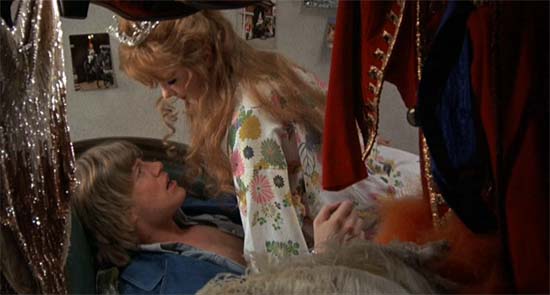 Granted, most of the time Guest is simply cashing a paycheck, and that’s largely due to the repetitive burlesque formula, which goes like this. (1) Timmy starts to get lucky with a client. (2) The client’s spouse walks in. (3) Timmy runs away. Because this might get a little old when repeated six or seven times throughout the film, Guest mixes it up a bit; for example: (1) Timmy gets lucky with a client. (2) A man walks in, and Timmy hides under the rug. (3) The woman, rebuffing the advances of the man, screams, “Let me introduce you to my husband!” (4) Timmy emerges from the rug. (5) The man screams and runs away, because he wasn’t her husband after all. OR: (1) A client is in tears because her lover is cheating on her, so Timmy suggests getting even by pretending to make love to him. (2) This they do, until her significant other enters, who turns out to be a woman. You see, they were lesbians. (3) That’s it, that was the joke. Go back to (2).
Granted, most of the time Guest is simply cashing a paycheck, and that’s largely due to the repetitive burlesque formula, which goes like this. (1) Timmy starts to get lucky with a client. (2) The client’s spouse walks in. (3) Timmy runs away. Because this might get a little old when repeated six or seven times throughout the film, Guest mixes it up a bit; for example: (1) Timmy gets lucky with a client. (2) A man walks in, and Timmy hides under the rug. (3) The woman, rebuffing the advances of the man, screams, “Let me introduce you to my husband!” (4) Timmy emerges from the rug. (5) The man screams and runs away, because he wasn’t her husband after all. OR: (1) A client is in tears because her lover is cheating on her, so Timmy suggests getting even by pretending to make love to him. (2) This they do, until her significant other enters, who turns out to be a woman. You see, they were lesbians. (3) That’s it, that was the joke. Go back to (2).
Many of these scenes do not actually have jokes, just premises which sort of puff and puff themselves to exhaustion. For example, I don’t know what to make of this variation: (1) Timmy asks an attractive maid about the guide to nude yoga lying upon the floor. She obliges by showing how it’s done; they both strip down to their undies and begin striking yoga positions. (2) The client, a middle-aged woman, interrupts the scene, and throws Timmy out. He isn’t even allowed to retrieve his shoes and ladder. That’s the humor-free end of the scene: he can’t get his shoes and ladder. But then Sid returns to the house with Timmy, to apologize for him, and the housewife accepts the apology. She subsequently tries to seduce Timmy, who, perhaps frightened that she’s older than 30, climbs out a window. No joke there, either, but there are two scenes that helpfully ate up some movie time for you.
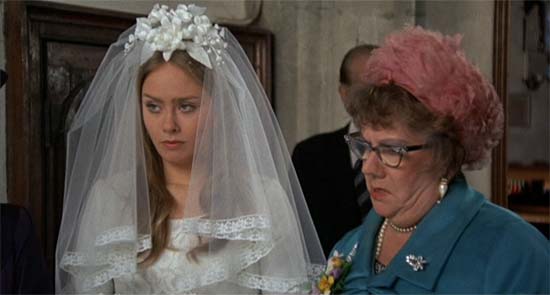 The Linda Hayden subplot is promising, or at least marginally more interesting. She’s a policewoman, and her father is a police inspector; as Sid nervously proclaims, “Only you could screw your way into a fuzz nest.” She rebuffs his sexual advances, but gives in when he awkwardly proposes marriage. On the wedding day, however, he’s on his way to the chapel when a pretty girl walks by; momentarily distracted, and trailing her a few steps, he’s cold-cocked by a rolled-up rug carried about by a mover. Oh, Timmy, will you never learn? He’s accidentally stowed away in the moving truck, and transported 60 miles away. Elizabeth waits for her fiance in vain. Humiliated, she runs off with Sid for a make-out session, and it’s left to the late-arriving Timmy to spray them with a water hose for his revenge. When last we see Timmy, he’s training a new recruit in the window washer trade, a spotty-faced kid whose many sexual misadventures lie ahead of him like rich fields of unploughed wheat. But Timmy is distracted again: a sexy client offers to clean her houseboat. Timmy agrees, responding, “I might even do your porthole for nothing!” Roll credits, queue the catchy theme song (“This is Your Life, Timmy Lea,” performed by Sue Cheyenne).
The Linda Hayden subplot is promising, or at least marginally more interesting. She’s a policewoman, and her father is a police inspector; as Sid nervously proclaims, “Only you could screw your way into a fuzz nest.” She rebuffs his sexual advances, but gives in when he awkwardly proposes marriage. On the wedding day, however, he’s on his way to the chapel when a pretty girl walks by; momentarily distracted, and trailing her a few steps, he’s cold-cocked by a rolled-up rug carried about by a mover. Oh, Timmy, will you never learn? He’s accidentally stowed away in the moving truck, and transported 60 miles away. Elizabeth waits for her fiance in vain. Humiliated, she runs off with Sid for a make-out session, and it’s left to the late-arriving Timmy to spray them with a water hose for his revenge. When last we see Timmy, he’s training a new recruit in the window washer trade, a spotty-faced kid whose many sexual misadventures lie ahead of him like rich fields of unploughed wheat. But Timmy is distracted again: a sexy client offers to clean her houseboat. Timmy agrees, responding, “I might even do your porthole for nothing!” Roll credits, queue the catchy theme song (“This is Your Life, Timmy Lea,” performed by Sue Cheyenne).
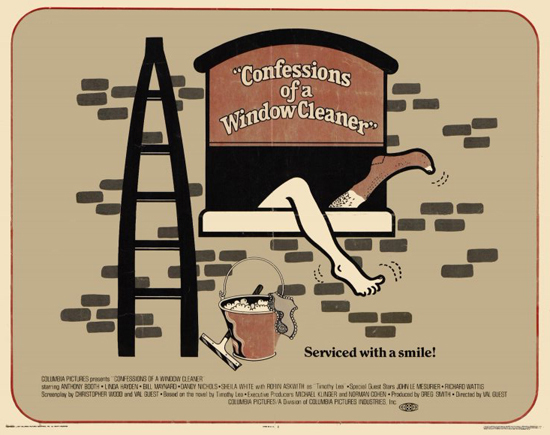
At last, the U.K. had a box office hit. Three sequels followed: Confessions of a Pop Performer, Confessions of a Driving Instructor, Confessions of a Holiday Camp; as well as rip-offs: Adventures of a Taxi Driver, etc. In a beauty & the beast kind of way, Askwith and Hayden made a good team, so they were duly reunited in Holiday Camp, as well as Let’s Get Laid (1978), in which he played a WWII soldier named Gordon Laid, whom people have to get. The British film industry pulled through the 70’s, plucky little chap that it was, but did they learn anything along the way? Sure. In the words of Sid the window-cleaner, “If some bird offers to squeeze out your shammy…don’t go retractin’ yer ladder.”









